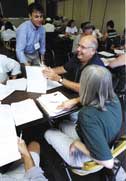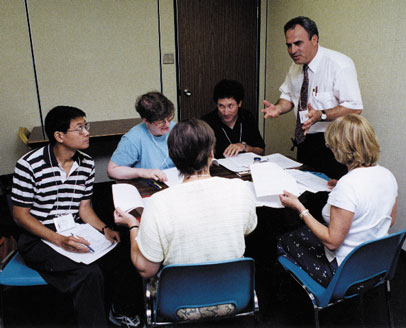By Tracy Morey The private sector spends four times more on professional development than Ontario’s education system does and it’s time for a major investment, says the Education Improvement Commission. "The whirlwind changes of the last four years, the shortage of teachers and a leadership gap in the system all point to the need for enhanced training and professional development," EIC co-chair Dave Cooke told Professionally Speaking as he ended his four-year mandate. In its fifth and final study – A Report on Improving Student Achievement – the commission recommends that the province spend one to three per cent of payroll on professional development and training for teachers, supervisors and support staff. An average 1.6 per cent of payroll is spent on training across all sectors in Canada. Matching that would translate into $170 million per year for professional development in Ontario education. Last year, Ontario school boards received about $41 million for professional development.
LINK TO ACHIEVEMENT Spending is just one piece of the puzzle, says the College’s Co-ordinator of Professional Affairs, Linda Grant. "But at least the commission has made it part of the agenda and the report reinforces the correlation between professional development and student learning." The report says new investment should cover professional development in leadership, accountability, curriculum training, communications, school and board improvement, planning skills as well as training for support staff. The report notes that the College of Teachers must keep pre-service teacher training up to date "so that teachers begin their careers with the skills they need to teach the current curriculum." TIME TO REDESIGN Grant says the guidelines for most in-service courses – previously issued by the Ministry of Education – haven’t been updated since 1978. Redesigning them is crucial, she says, since areas such as current curriculum policy, technology and student assessment and evaluation haven’t been integrated into the design or delivery of programs. "A lot of work must go into redesigning courses that meet the needs of today’s classrooms. And, of course, there are many ways to learn other than courses. There is mentoring, watching exemplary teachers … it’s not just a matter of a little workshop here and there, teachers have to own it." The EIC says the Ministry should consult with all partners in the system to assess their needs for professional development and training. Then the essentials should be co-ordinated so "adequate, cost-effective upgrading is available to everyone who needs it." CHANGE DEMANDS TRAINING Dave Cooke says the Ministry of Education’s in-service training for the new curriculum should have been more timely, rather than rushed in at the last minute. The report warns the Ministry that, when new curriculum and policies are introduced, it must, "take care to allow enough time for employees to receive necessary professional development. Education reforms simply won’t work if staff are not ready to implement them – so timely upgrading of knowledge and skills must become part of our culture of continuous improvement." Cooke is also concerned about a leadership gap in education, brought on by the size and complexity of the school system and the large number of directors and principals retiring. "Directors and supervisory officers need to be more than good administrators," he said. "We can’t expect principals to work with school councils without training. We need training to improve planning. I’m not sure we’re keeping up." The EIC called on the Ministry of Education to review the leadership requirements for directors of education and supervisory officers – qualifications, skills and experience EIC MANDATE The provincial government set up the Education Improvement Commission four years ago to oversee the restructuring of the province’s education system. It was headed by Cooke, a former education minister, and former Toronto school board chair Anne Vanstone. The EIC’s mandate was to co-ordinate the election of trustees to the new district school boards in 1997, exercise controls on board spending, conduct research and make recommendations to the Minister of Education on policy issues related to education reform.
SHORTAGES A CRISIS The report reiterates the threat of teacher shortages and calls for quick action by the Ministry of Education and the College of Teachers to expand recruitment. The commission originally expressed concern over shortages (particularly for French boards and smaller northern boards) in its January 2000 report. Dave Cooke says the Ministry, the College and the faculties of education must co-ordinate to project future demographic demands and particularly demands for certain courses and disciplines. "We’ve known about the teacher shortages and everybody knows the funding for 6,000 new faculty of education spaces over five years won’t be enough," he said. "Wages will also have to be part of the package in the next few years, especially when we have other jurisdictions recruiting teachers in Ontario, like New York state for instance, offering large first-year salaries for some of its schools." TWO CHALLENGES The EIC report’s combined focus on teacher recruitment and professional development rightly captures the profession’s priorities over the next decade, says College human resources consultant Frank McIntyre. "Ten years from today, most of the people teaching in our elementary and secondary schools will be new. The average age and experience will move way down. There will be turnover to a new generation of teachers who will need mentoring, guidance and training. We’ll be shaping the next 35 years of Ontario’s school system with the teachers we hire now, and the most important thing for the profession to look at is support and development for those teachers."
|
||||
|
|


